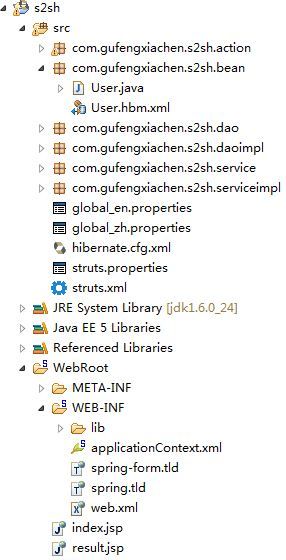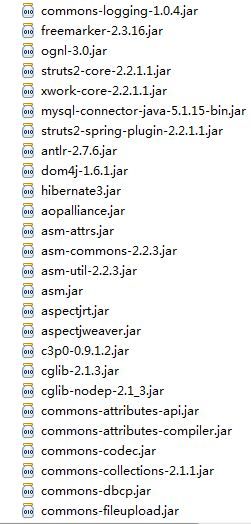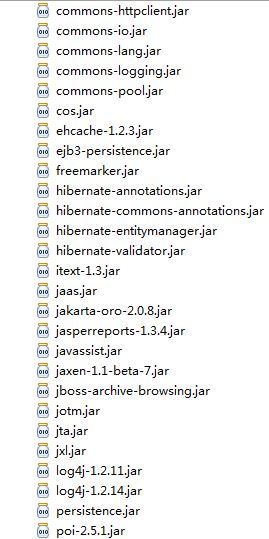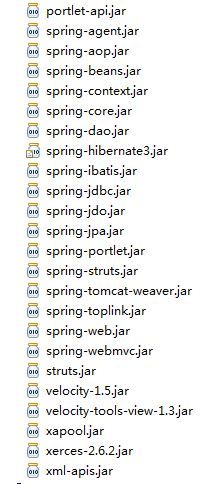struts2.2+hibernate3.2+spring2整合入门实例
环境:windows 7+MyEclipse 8.6
服务器: Tomcat 6.0
框架版本:struts2.2+hibernate3.2+spring 2.2
项目目录结构:
步骤一,添加框架支持的包:
步骤二:编写jsp页面:index.jsp:
<%@ page language="java" import="java.util.*" pageEncoding="UTF-8"%>
<%@ taglib prefix="s" uri="/struts-tags" %>
<%
String path = request.getContextPath();
String basePath = request.getScheme()+"://"+request.getServerName()+":"+request.getServerPort()+path+"/";
%>
<!DOCTYPE HTML PUBLIC "-//W3C//DTD HTML 4.01 Transitional//EN">
<html>
<head>
<base href="<%=basePath%>">
<title>Login</title>
</head>
<body>
<h2 style="color: red">Login</h2>
<s:form action="login" namespace="/user">
<s:textfield name="user.username" label="%{getText('username')}"> </s:textfield>
<s:password name="user.password" label="%{getText('password')}"></s:password>
<s:submit name="submit" value="%{getText('submit')}"></s:submit>
</s:form>
</body>
</html>
result.jsp:
<body>
Login success!
</body>
步骤三:编写web.xml文件:
<?xml version="1.0" encoding="UTF-8"?>
<web-app version="2.5"
xmlns="http://java.sun.com/xml/ns/javaee"
xmlns:xsi="http://www.w3.org/2001/XMLSchema-instance"
xsi:schemaLocation="http://java.sun.com/xml/ns/javaee
http://java.sun.com/xml/ns/javaee/web-app_2_5.xsd">
<welcome-file-list>
<welcome-file>index.jsp</welcome-file>
</welcome-file-list>
<filter>
<filter-name>struts2</filter-name>
<filter-class>org.apache.struts2.dispatcher.ng.filter.StrutsPrepareAndExecuteFilter</filter-class>
</filter>
<filter-mapping>
<filter-name>struts2</filter-name>
<url-pattern>/*</url-pattern>
</filter-mapping>
<listener>
<listener-class>
org.springframework.web.context.ContextLoaderListener
</listener-class>
</listener>
</web-app>
步骤四:建数据库,(本例用MySQL),编写映射文件User.hbm.xml:
<?xml version="1.0" encoding="UTF-8"?> <!DOCTYPE hibernate-mapping PUBLIC "-//Hibernate/Hibernate Mapping DTD 3.0//EN" "http://hibernate.sourceforge.net/hibernate-mapping-3.0.dtd"> <hibernate-mapping> <class name="com.gufengxiachen.s2sh.bean.User" table="user" catalog="test"> <id name="id" column="id" type="int"> <generator class="increment"></generator> </id> <property name="username" column="username" type="string"></property> <property name="password" column="password" type="string"></property> </class> </hibernate-mapping>
步骤五:编写struts.xml文件:
<?xml version="1.0" encoding="UTF-8" ?>
<!DOCTYPE struts PUBLIC
"-//Apache Software Foundation//DTD Struts Configuration 2.0//EN"
"http://struts.apache.org/dtds/struts-2.0.dtd">
<struts>
--><package name="s2sh" extends="struts-default" namespace="/user" >
<action name="login" class="loginAction" >
<result name="success">/result.jsp</result>
<result name="input">/index.jsp</result>
</action>
</package>
</struts>
步骤六:编写spring配置文件applicationContext.xml:
<?xml version="1.0" encoding="UTF-8"?> <beans xmlns="http://www.springframework.org/schema/beans" xmlns:xsi="http://www.w3.org/2001/XMLSchema-instance" xmlns:p="http://www.springframework.org/schema/p" xsi:schemaLocation="http://www.springframework.org/schema/beans http://www.springframework.org/schema/beans/spring-beans-2.0.xsd"> <bean id="dataSource" class="org.apache.commons.dbcp.BasicDataSource"> <property name="driverClassName" value="com.mysql.jdbc.Driver"></property> <property name="url" value="jdbc:mysql://localhost:3306/test"></property> <property name="username" value="root"></property> <property name="password" value=""></property> <property name="maxActive" value="100"></property> <property name="defaultAutoCommit" value="true"></property> </bean> <bean id="sessionFactory" class="org.springframework.orm.hibernate3.LocalSessionFactoryBean"> <property name="dataSource" ref="dataSource"></property> <property name="hibernateProperties"> <props> <prop key="hibernate.dialect">org.hibernate.dialect.MySQLDialect</prop> <prop key="hibernate.show_sql">true</prop> </props> </property> <property name="mappingResources"> <list> <value>com/gufengxiachen/s2sh/bean/User.hbm.xml</value> </list> </property> </bean> <bean id="userDao" class="com.gufengxiachen.s2sh.daoimpl.UserDAOImpl" scope="singleton"> <property name="sessionFactory"> <ref bean="sessionFactory"/> </property> </bean> <bean id="userService" class="com.gufengxiachen.s2sh.serviceimpl.UserServiceImpl"> <property name="userDao" ref="userDao"></property> </bean> <bean id="loginAction" class="com.gufengxiachen.s2sh.action.LoginAction"> <property name="userService" ref="userService"></property> </bean> </beans>步骤七:编写控制层Action,服务层(业务逻辑)Service,数据访问层,由于代码太多,详细代码见附件!



